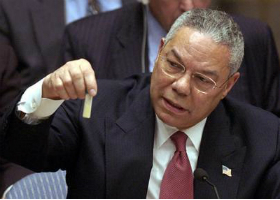Gourley's Strachan Files (II): Was Colin Powell the worst general of the GWOT?

By Jim Gourley
Best Defense chief military culture correspondent
One of the things
that struck me most about Hew Strachan's The Direction
of War was his assessment
of individual cases of strategic short-sightedness. Tom has already mentioned that Sir Hew took a pretty hard swipe at Samuel Huntington. But his
remarks about Colin Powell seemed more remarkable compared to how he treated
other American generals. He's pretty defensive of guys who have somewhat become
poster boys for screw-ups in generalship. Take these snippets from Strachan
dealing with Stanley McChrystal running away with Rolling Stone:
Of the belief that
the interview had challenged civilian authority over the military: "But
McChrystal had not set out to challenge that norm. This was a cock-up, not a
conspiracy. His dignified response, and his refusal to try to justify or
explain away the remarks attributed to him, confirmed his disciplined
acceptance of his own constitutional position. What he had done was something
rather different: he and his colleagues had vented their frustration at the
lack of clear political guidance within which McChrystal's own operational
concepts were meant to sit."
And then later:
"In 1952, when General Douglas MacArthur was recalled by President Harry
Truman, his sin was to have called for a change in strategy; by contrast
McChrystal just wanted a strategy."
Strachan also gives
a nice get-out-of-jail card to General Ricardo Sanchez for shutting the
civilian side of the government out of his phase four planning: "Once in
Iraq, Ambassador Paul Bremer said that his job was policy and General Ricardo
Sanchez's was the war, and that each should stick to his own sphere. So he
should not have been surprised when he, not unreasonably, asked Sanchez for
details of his tactical plans, and Sanchez responded, 'Stop right there, sir. I
am not going to give you the details of our tactical plan.'"
And even though
Strachan does call Tommy Franks naive and arrogant, he still finds cause for
leniency in the context of his planning environment. Strachan contends that
Washington had become so obsessed with keeping the military out of politics
that it also insisted on keeping political leadership out of military affairs.
"Keep Washington focused on policy and strategy. Leave me the hell alone
to run the war," he quotes Franks in speaking to Deputy Secretary of
Defense Paul Wolfowitz. To a great extent, he argues, Franks was a product of
the system, and the system went on to fail the man it created.
But it's Colin
Powell that Strachan never lets off the hook for creating the system in the
first place. No accomplices or extenuating circumstances are ever introduced in
his case. Strachan even rips him for misreading Clausewitz on the "trinity
of war." While he specifies that most of Powell's ideas manifested
themselves in Caspar Weinberger's eponymous doctrine, he more frequently refers
to it as the Powell doctrine.
The indictment
reads:
Thanks to Colin
Powell and his intellectual legacy, American military thought at the dawn of
the new millennium had become quite explicit about its separation from the
context of policy. Smarting from the effects of the Vietnam War on the US army,
Powell said that US forces should be used to achieve clear political
objectives, which should be determined in advance, and that they should be
deployed with overwhelming military force to achieve a quick victory: their
'exit strategy' should be clear.
The Powell doctrine
collapsed when it confronted the practice of war in the first decade of the
twenty-first century. Today Powell might say that the results of not using
overwhelming force and not having a clear 'exit strategy' are evident for all
to see. But in advocating a clear demarcation between strategy and policy, he
prevented the engagement of one with the other, and his legacy survives in
principles to which many in the United States Army still adhere. What the Iraq
War also showed, and a point that Powell also failed to address ... was the
fact that it would be the enemy -- more than the American government -- that
would be trying to prevent the United States army from achieving quick victory.
Classical strategy, and Clausewitz in particular, recognised that the relationship
between strategy and policy was central, even if contested. Powell and his
heirs worked hard to resolve that contest by divorcing policy from operational
thought.
Thomas E. Ricks's Blog
- Thomas E. Ricks's profile
- 437 followers



